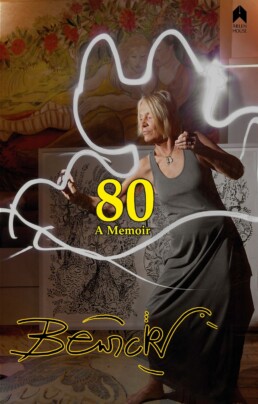Smaointe ar Árainn / Thoughts On Aran
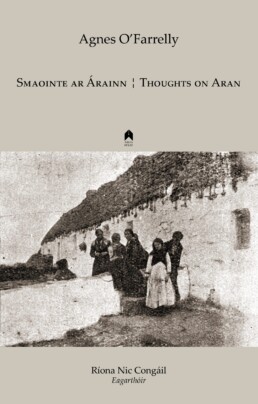
Agnes O’Farrelly
Smaointe an Árainn / Thoughts On Aran
ISBN:
9780905223728 hardback
9781851320967 paperback
Is minic a ghlactar le The Aran Islands ó pheann John Millington Synge mar léiriú deifnídeach ar Oileáin Árann ach is beag duine atá ar an eolas faoi iníon léinn ollscoile darbh ainm Úna Ní Fhaircheallaigh a d’imigh ar cuairt go dtí na hoileáin i samhradh na bliana 1898. D’fhan sí sa teach iascaire a d’fhág Synge díreach roimpi, agus scríobh sí dialann taistil dar teideal Smaointe ar Árainn, faoin seal a chaith sí ar na hoileáin. Is cáipéis shóisialta agus chultúrtha í seo, a bhaineann le hInis Meáin ach go háirithe agus a scríobhadh i ré idir dhá chultúr: nuair a bhí cultúr nua-aoiseach na míntíre ag teacht i dtír ar chultúr ársa Gaelach Árann. Sa dialann seo, a dhíríonn ar mhná Árann go príomha, a ndéantar faillí orthu i scríbhinní eile go minic, léiríonn Ní Fhaircheallaigh modus operandi Chonradh na Gaeilge agus é ag déanamh iarrachta an cultúr Gaelach a chosaint agus a nuachóiriú ag an am céanna ag tús an fhichiú haois.
John Millington Synge’s The Aran Islands has long been considered a definitive depiction of the Aran Islands, off the Connemara coast. Less well known is that a young university student named Agnes O’Farrelly also travelled to the islands in the summer of 1898, lodged in the same fisherman’s cottage Synge had just vacated, and proceeded to write an Irish-language travelogue about her experiences on the islands. O’Farrelly’s travelogue, entitled Thoughts on Aran, is here translated into English for the first time. This is a social and cultural document which portrays a period of transition in Inis Meáin in particular, when age-old Gaelic culture was succumbing to the influence of the modern world. Focusing primarily on Aran women, much neglected in previous literature, O’Farrelly reveals the modus operandi of the Gaelic League as it simultaneously attempted to protect and to modernise the Gaelic culture of the Aran Islands at the turn of the twentieth century.
Hilda Tweedy and the Irish Housewives Association: Links in the Chain
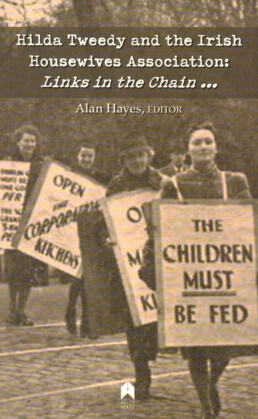
Alan Hayes (ed.)
Hilda Tweedy and the Irish Housewives Association: Links in the Chain
ISBN: 9781851320332
These 13 essays have been compiled in tribute to Hilda Tweedy (1911–2005) and the Irish Housewives Association (1942–1992), key links in the feminist chain of history. The collection demonstrates that Hilda Tweedy’s life, work and legacy present us with many blueprints to follow as we work towards equality, human rights and peace in our society.
Contributors:
Mary Robinson
Margaret Mac Curtain
Mary Cullen
Caitríona Clear
Rosemary Cullen Owens
Bryce Evans
Aisling Farrell
Diarmaid Ferriter
Maryann Gialanella Valiulis
Mary Ryan
Sonja Tiernan
Alan Hayes
Catriona Crowe
Susan McKay
Helena Molony: A Radical Life, 1883-1967
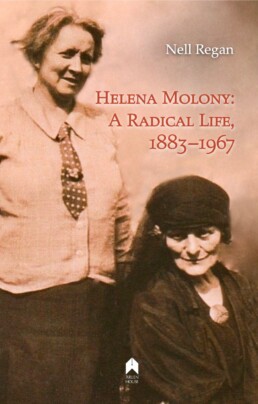
Nell Regan
Helena Molony: A Radical Life, 1883-1967
ISBN:
9781851321650 paperback
9781851321667 hardback
Available from
Helena Molony is one of the most fascinating activists in twentieth-century Irish history, and also one of the most allusive, so this first biography, Helena Molony: A Radical Life, 1883–1967, is timely. Historian Nell Regan, who pioneered research on Molony, sheds light not only on Helena Molony, but on the many causes and characters she worked with during her long public career.
Of all the many figures whose political and personal lives have been re-assessed during the decade of commemorations, Molony stands out as one of the most compelling and worthy of further research … She was a feminist, a republican, a socialist, a trade union activist and an actress and the publication of this biography represents a welcome and important development in our understanding of Molony’s life and times … It is a book about Molony’s political life, but it is also a book about friendships and about the endurance of networks of love and support across the decades … The account presented in these pages is not always flattering, but it is an honest and enlightening depiction of a remarkable – and radical – Irish life.
– Senia Pašeta
Helena Molony was one of the most important female activists of the Irish revolutionary era yet she has never been the subject of a major biographical study until now. Nell Regan’s book more than makes up for past neglect. It charts her life as a campaigning journalist, an Abbey actress, one of James Connolly’s closest confidantes in the Irish Citizen Army during the period leading up to the Easter Rising, and her time as general secretary of the Irish Women Workers Union during the crucial period after 1916 when it almost collapsed. She would go on campaign for workers and women’s rights in an increasingly conservative society that was intolerant of dissent. Her refusal to conform to the social, sexual or economic mores of her day took a heavy toll on her health and later career.
– Pádraig Yeates
Nell Regan is an award-winning poet and non-fiction writer. Her collections include One Still Thing (Enitharmon Press, 2014), Bound for Home(Arlen House, 2011) and Preparing for Spring (Arlen House, 2007). Her biographical article on Helena Molony appeared in Female Activists: Irish Women and Change, edited by Mary Cullen and Maria Luddy (Woodfield Press, 2001). She has been an International Writing Fellow at the University of Iowa, recipient of an Arts Council bursary and, most recently, a Patrick and Katherine Kavanagh Fellow.
Metaphors For Change: Essays on State and Society
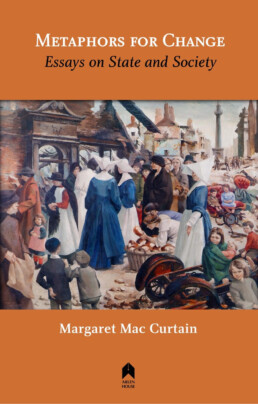
Margaret Mac Curtain
Metaphors For Change: Essays on State and Society
ISBN: 9781851322220
Margaret Mac Curtain – feminist, educator, activist, Dominican nun – has, since the 1960s, been an influential and respected commentator on Irish society. In this book of essays – the sister collection to her acclaimed Ariadne’s Thread: Writing Women into Irish History (Arlen House, 2008) – she engages, in her uniquely insightful and frequently challenging way, with feminism, culture, Irish history and politics, mathematics, activism, spirituality and theology, education and women’s history, in essays written from the 1960s to the 2010s. In a writing style that makes the complicated accessible and elevates the local to the international, these essays shine a spotlight on both the individual and collective experiences of women and men in Irish society over many centuries.
I still remember what an inspiration Margaret Mac Curtain was to me during those years when women scholars and writers struggled with bias and simplification in Ireland. Her perspective was and is very important. It showed me then and reminds me now that no matter how difficult a circumstance, an individual voice can still have the power to suggest a better future. Which is exactly what she did. And she was part of building it.
– Eavan Boland
Margaret stood out as a woman of integrity and principle over the years, and she did it with wit and grace. Her writing inspired many of us to continue the fight for equality and justice.
– Mary Robinson
Margaret? She is “… the Sunday in every week” – our Ambassador Extraordinaire who has brought veritas and history to the world.
– Maureen Murphy
Margaret Mac Curtain is one of our finest historians and educators, a path-breaker for women’s history and a shaper of contemporary Ireland. We owe her a great debt of gratitude for her generous vision and persistence in the face of considerable odds.
– Ailbhe Smyth
Margaret Mac Curtain’s scholarship, insight and acumen have been at the heart of humane change in Irish society for generations.
– Angela Bourke
A pioneer of interdisciplinary studies and gender studies in Ireland, Sister Ben is warmly remembered by her students for her ability to simultaneously encourage and challenge, sparking a critical approach, leading to completely fresh perspectives. There were no value judgements, and her graduate students, in particular, attest to her intellectual generosity, her inclination to give of all she had to allow the student to develop.
– Moya Cannon
I was one of the lucky seven who took Dr Margaret Mac Curtain’s women’s documents course in UCD in 1990 – it was the single most transformative event of my professional life.
– Sinead McCoole
80: A Memoir
Ireland’s best-known artist celebrates her eightieth birthday with a refreshingly honest memoir of an extraordinary life. From growing up in County Kerry to becoming an internationally successful artist, Bewick remains an intregral part of Ireland’s cultural legacy.
Mary Hayden Irish Historian and Feminist
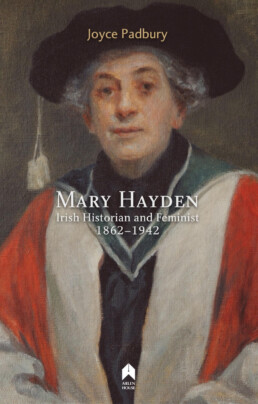
Joyce Padbury
Mary Hayden: Irish Historian and Feminist, 1862–1942
ISBN: 978-1-85132-263-3
Mary Hayden: Irish Historian and Feminist, 1862–1942 is a very significant contribution to the field of modern Irish social and political history. Joyce Padbury has filled an important gap, not only in Irish women’s history but also in terms of the development of Irish academic institutions and education history, not least of the National University of Ireland and of University College Dublin. Mary Hayden belonged to the first generation of Irish women academics and university professors, and of that generation she was to the fore. This biography encompasses the evolution of both a life and a wider society from the mid-Victorian period to the modern era in Irish history. Hayden’s interest in the Gaelic Revival and the Gaelic League led her to add fluency in modern Irish to her linguistic accomplishments, along with a close friendship with Pearse, although she disapproved of the 1916 Rising. Padbury recounts engagingly Hayden’s battles in academia. In the process, she shows how Hayden became one of the foremost feminist campaigners, along with Agnes O’Farrelly and Hanna Sheehy Skeffington. Padbury’s work is valuable and provides a persuasive account of the role and opinions of a moderate nationalist.
– Fergus D’Arcy
Mary Hayden was an exceptional figure, representative in some respects and highly individual in others. She emerges as an independent-minded and determined woman who was conscious of her own abilities and appropriately ambitious; she was impatient of the obstacles facing her in a male-dominated world. She was well-trained, well-travelled, and well-connected. For decades she played an important role in educating the elite of the Irish Free State, but she also had an exceptional concern for the underprivileged. Joyce Padbury brings out clearly how Hayden was quite remarkable in her concern with ‘unfashionable’ areas of history – in particular with the female half of the population, and with the poor and oppressed. She was a (neglected) pioneer.
Hayden was a professor for decades, a long-serving member of UCD’s Governing Body, and a member of the Senate of the National University. She was a power-broker in the university world. But perhaps even more importantly, she was a consistent (and persistent) feminist whose influence could be seen over many decades – climaxing in her opposition to de Valera’s 1937 Constitution. To take one example: she was enlightened in her attitude towards prostitution, deploring the fact that ‘fallen women’ were punished while men were applauded for ‘gallantry’. In many ways she was a ‘New Woman’, and although a nationalist for most of her career, in her hierarchy of values nationalism always took second place to the cause of equality for women.
– Michael Laffan

